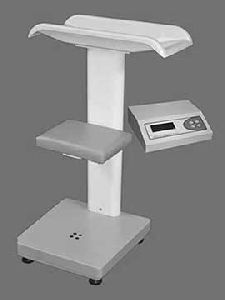
Digital Weighing Scale
Get Price Quote
All Age Digital Weighing Scale(3 in 1)200 Kg with +/- 20 gm Accuracy Durable, Moulded Plastic Baby Tray for Infant Folding Seat for Sitting Child Sturdy Platform for an Adult Separate LED Display Module to be kept on table or hanged on the wall Feather Touch Keys Zero Setting Facility Auto Hold Facility for Accurate Weighing of Active Babies Kg to Pound Conversion Facility Operating Voltage : 230VI50Hz AC

Sanghi Weighing Scale
Get Price Quote
Dial Scale 3205 CLE / COE Capacities: - 100, 200, 300, 500 & 1000 Kg. White pointer with black indicator to give shadowless line-to-line (non-parallax) indication on 584 mm dia. Ready line . Scale mounted on four wheels enclosed in a substantial cast iron frame. Tough, dust proof and moisture proof housing to stand up to any conditions. This ensures no rusting and no deterioration of the mechanism components.
Best Deals from Weighing Machine
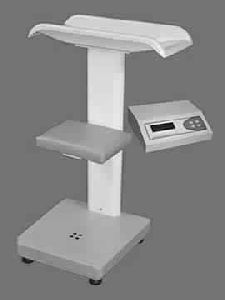
Digital Weighing Scale
Get Price Quote
Durable, Moulded Plastic Baby Tray for Infant Folding Seat for Sitting Child Sturdy Platform for an Adult Separate LED Display Module to be kept on table or hanged on the wall Feather Touch Keys Zero Setting Facility Auto Hold Facility for Accurate Weighing of Active Babies Kg to Pound Conversion Facility Operating Voltage : 230VI50Hz AC
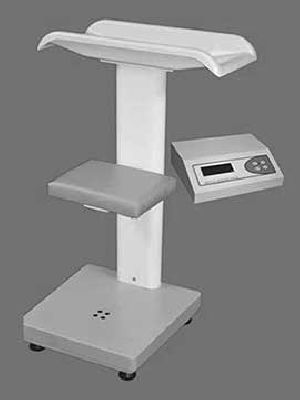
Digital Weighing Scale
Get Price Quote
All Age Digital Weighing Scale(3 in 1)200 Kg with +/- 20 gm Accuracy Durable, Moulded Plastic Baby Tray for Infant Folding Seat for Sitting Child Sturdy Platform for an Adult Separate LED Display Module to be kept on table or hanged on the wall Feather Touch Keys Zero Setting Facility Auto Hold Facility for Accurate Weighing of Active Babies Kg to Pound Conversion Facility Operating Voltage : 230VI50Hz AC
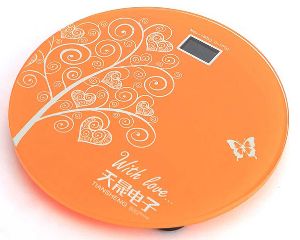
Personal Electronic Weighing Scale
Get Price Quote
Multicolour Body Personal Electronic Weighing Scale Capacity 5-396Lbs 2.5-150Kg/180Kg - BYESLE1 Specifications - Weight Capacity 5-396Lbs 2.5-150Kg/180Kg - Four Digit LCD Display - Battery CR2032 Li 3V - Working Temperature Range 50-95F 10-35C - Turn On Auto - Auto Off In 10 Seconds - Hint of Wrong "Err" - Hint of Out "OL" Operating Instructions - Remove The Battery Saver Tab From The Back of The Scale Near The Battery Compartment Prior To Operation - Place The Scale On An Even Dry Surface Prior To Weighing - Step Onto The Scale, Balance Your Weight Evenly And Wait Until The Display Reads Your Weight. Your Weight Will Flash On The Readout For 10 Seconds - If You Receive An Error Indicator Wait For The Scale To Automatically Shut Down And Restart The Weighing Process - Replace The Battery Immediately When You See The LO Battery Indicator - Keep The Scale Clean And Dry To Prevent Damage To The Mechanism And To Prevent Slips And Fails Attention - Do Not Leave Any Object On The Scale When Not In Use - Make Sure You Stand In The Centre of The Scale To Avoid Tipping - Balance Your Weight Evenly On Each Foot To Insure Proper Weighing And To Avoid Errors - The Scales Surface Is Made of Tempered Glass But Can Break If Abused, Avoid Dropping OR Impacting The Scale - To Clean, Wipe Scale Surface With A Clean Dry Cloth - The Scales Mechanism Can Be Damaged If Immersed In Water - Reset The Scale By Removing The Battery. Wait At Least 10 Seconds Prior To Replacing The Battery To Properly Reset The Scale
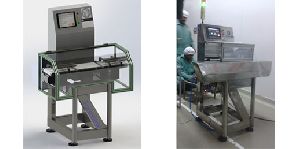
Check Weigher Machine
Get Price Quote
A checkweigher is an automatic machine for checking the weight of packaged commodities online in dynamic condition. It is normally found at the offgoing end of a production process and is used to ensure that the weight of a pack of the commodity is within specified limits. Any packs that are outside the tolerance are taken out of line automatically. A checkweigher is a system that weighs items as they pass through a production line, classifies the items by preset weight zones, and ejects or sorts the items based on their classification. Checkweighers weigh 100% of the items on a production line. Typically, an infeed section, scale section, discharge section, rejecter or line divider, and computerized control comprise the physical checkweighing system. Checkweighers and their components vary greatly according to how they are used, the items being weighed, and the environment surrounding them. A checkweigher can weigh in excess of maximum items per minute (depending on product size and accuracy requirements).Checkweighers often incorporate additional checking devices such as metal detectors and X-ray machines to enable other attributes of the pack to be checked and acted upon accordingly. “Simply stated, a checkweigher weighs, classifies, and segregates items by weight.” For high-speed precision scales, a load cell using electromagnetic force restoration(EMFR) is appropriate. This kind of system charges an inductive coil, effectively floating the weigh bed in an electromagnetic field. When the weight is added, the movement of a ferrous material through that coil causes a loss of ElectroMagnetic Force. A precision circuit charges the coil back to its original charge. The amount added to the coil is precisely measured. The voltage produced is filtered and sampled into digital data. That voltage is then passed through a Digital Signal Processor (DSP) filter and ring-buffer to further reduce ambient and digital noise and delivered to a computerized controller.It is usual for a built-in computer to take many weight readings from the transducer over the time that the package is on the weigh bed to ensure an accurate weight reading.Calibration is critical. A lab scale, which usually is in an isolated chamber pressurized with dry nitrogen(pressurized at sea level) can weigh an object within plus or minus 100th of a gram, but ambient air pressure is a factor. This is straightforward when there is no motion, but in motion there is a factor that is not obvious-noise from the motion of a weigh belt, vibration, air-conditioning or refrigeration which can cause drafts. Torque on a load cell causes erratic readings.A dynamic, in-motion checkweigher takes samples, and analyzes them to form an accurate weight over a given time period. In most cases, there is a trigger from an optical(or ultrasonic) device to signal the passing of a package. Once the trigger fires, there is a delay set to allow the package to move to the "sweet spot" (center) of the weigh bed to sample the weight. The weight is sampled for a given duration. If either of these times are wrong, the weight will be wrong. There seems to be no scientific method to predict these timings. Some systems have a "graphing" feature to do this, but it is generally more of an empirical method that works best. A reject conveyor to enable the out-of-tolerance packages to be removed from the normal flow while still moving at the conveyor velocity. The reject mechanism can be one of several types. Among these are a simple pneumatic pusher to push the reject pack sideways from the belt, a diverting arm to sweep the pack sideways and a reject belt that lowers or lifts to divert the pack vertically. A typical checkweigher usually has a bin to collect the out-of-tolerance packs. Tolerance methods There are several tolerance methods: The traditional "minimum weight" system where weights below a specified weight are rejected. Normally the minimum weight is the weight that is printed on the pack or a weight level that exceeds that to allow for weight losses after production such as evaporation of commodities that have a moisture content. The larger wholesale companies have mandated that any product shipped to them have accurate weight checks such that a customer can be confident that they are getting the amount of product for which they paid. These wholesalers charge large fees for inaccurately filled packages. Application considerations Speed and accuracy that can be achieved by a checkweigher is influenced by the following: Pack length Pack weight Line speed required Pack content (solid or liquid) Motor technology Stabilization time of the weight transducer Airflow causing readings in error Vibrations from machinery causing unnecessary rejects Sensitivity to temperature, as the load cells can be temperature sensitive Quality control tape Band with the principles of quality control weight Weighing tape quality control principles Automatic weighing tape Weight control tape Food weight control tape Drug for weight control tape Detergent industry for the quality control tape Weight control tape for chemical industry Weight control tape for the pasta industry Flour weight control tape for the industry Applications In-motion scales are dynamic machines that can be designed to perform thousands of tasks. Some are used as simple caseweighers at the end of the conveyor line to ensure the overall finished package product is within its target weight.An in motion conveyor checkweigher can be used to detect missing pieces of a kit, such as a cell phone package that is missing the manual, or other collateral. Checkweighers are typically used on the incoming conveyor chain, and the output pre-packaging conveyor chain in a poultry processing plant. The bird is weighed when it comes onto the conveyor, then after processing and washing at the end, the network computer can determine whether or not the bird absorbed too much water, which as it is further processed, will be drained, making the bird under its target weight.A high speed conveyor scale can be used to change the pacing, or pitch of the products on the line by speeding, or slowing the product speed to change the distance between packs before reaching a different speed going into a conveyor machine that is boxing multiple packs into a box. Typical Uses of a Checkweighers Check for under and/or overweight filled packages Insure compliance with net contents laws for prepackaged goods Check for missing components in a package including labels, instructions, lids, coupons, or products Verify count by weight by checking for a missing carton, bottle, bag, or can in a case Check package mixes against weight limits to keep the solid to liquid ratio within established standards Reduce product giveaway by using checkweigher totals to determine filler adjustments Classify products into weight grades Insure product compliance with customer, association, or agency specifications Weigh before and after a process to check process performance Fulfill USDA or FDA reporting standards Measure and report production line efficiency
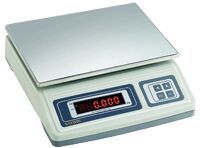
Surya Table Top Weighing Machine
Get Price Quote
we are offering surya table top weighing machine. these weighing scales are suitable for tea coffee shops, sweets dry fruits shops, oil groceries shops, food bakery shops, super markets, hotels and restaurants, etc.

Hanging Weighing Scale
Get Price Quote
Hanging Weighing Scale, Mixer Grinder, Espresso Coffee Maker

Weighing Scales
Get Price Quote
Weighing Scales, Surgical Equipment, Digital Panel Meter